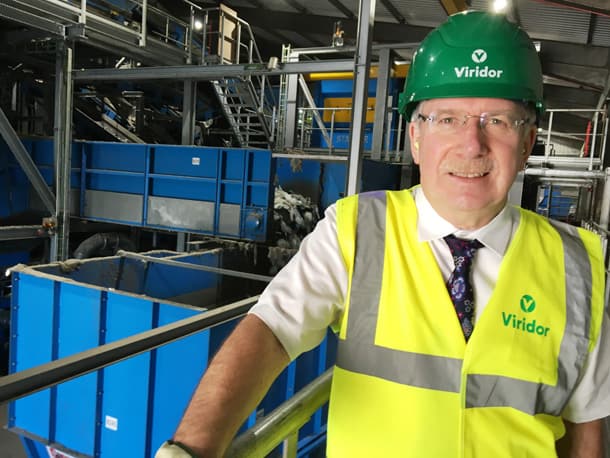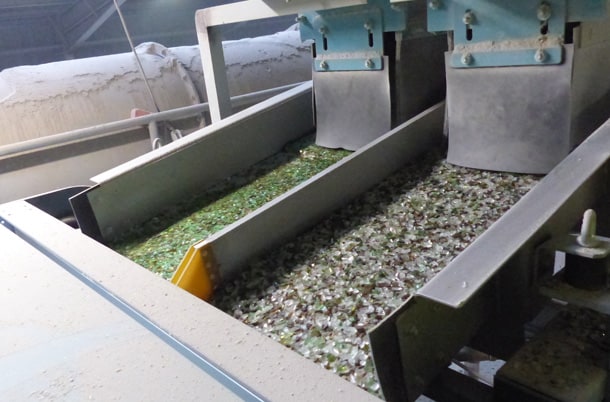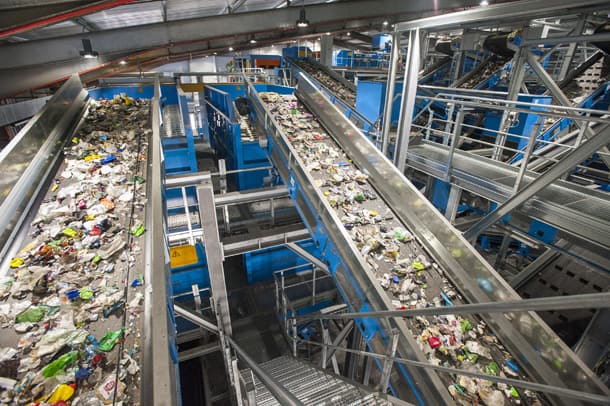INTERVIEW: In the wake of months of volatile recycling markets, the appointment of a former oil man to head up Viridor’s resource and recycling division looks to have been a sound move.
Keith Trower, who took on the post of managing director of Viridor Resource Management just over a year ago, is finding that his 18 years involvement with oil markets at BP have served him well in the challenging recyclate markets. His additional wide-ranging industry and trade association experience have been beneficial across all business areas, from selling recycled paper to supplying plastic to large retailers.
Brought into the company by Viridor managing director Phil Piddington in 2015, his first task was to look at finding outlets for Incinerator Bottom Ash (IBA) generated by the company’s energy recovery facilities (ERFs)
‘First commandment’
Mr Trower declares that within Viridor the “first commandment is that it doesn’t go to landfill” and “then we have to see what application it does have”. With this in mind, he helped Viridor to find significant value in the output from the ERFs. Processing agreements were put in place allowing for the recovery of 50-60,000 tonnes per annum of ferrous and non-ferrous metals and the remaining 500,000 tonnes of Incinerator Bottom Ash (IBA) is used for aggregate purposes in highway applications. He explains, “even the Bottom Ash is a resource – yes you pay someone to process it but the value recovered from the metals more than compensates for the transport and processing costs.”
Mr Trower, who is based at Viridor Resource Management’s offices in Rochester, Kent, close to one of the business’s plastics recycling facilities, says that while IBA volumes are large in their own right, volumes of recyclables are considerably higher and have proved challenging over recent months.

Keith Trower – from oil to recyclables
“We have about 1.6 million tonnes of recycled material being traded through the Rochester office every year” generated by what is believed to be the UK’s largest network of waste facilities. These include 26 recycling facilities and 12 ERFs, including four in commission or under construction. Among the infrastructure are eight materials recycling facilities (MRFs) and five dedicated recycling plants.
Metals and WEEE
Besides coming out of IBA, metals are also generated from MRFs, HWRCs and Viridor’s Waste Electrical and Electronic Equipment (WEEE) sites. “We look to add value to metals recycling for all parties and support the circular economy. We also want the UK to be competitive and as such we support British industry by selling our metals output from MRFs to companies in the UK.”
Glass
Glass has always been a material, which Viridor has handled in large volumes and it now handles around 500,000 tonnes per annum. Viridor has two main processing facilities for glass, one in Sheffield and the other in Newhouse, Scotland. During 2017/18 some 250,000 tonnes of infeed glass was processed by the two sites from local authorities and C&I collections with a total cullet output of about 200,000 tonnes, the majority of which is supplied back into the UK glass remelt market to produce new glass bottles and jars, with a small proportion being recycled back into aggregate uses.
“We really need to ensure that stakeholders in Scotland see Newhouse as integral to their circular economy ambitions”
Mr Trower considers Viridor’s work in the glass sector as further evidence of its contribution to the circular economy and says: “We are a very important supplier of glass into the UK market”.
He also emphasises that Viridor has contributed £20 million in investment to the Newhouse Glass Plant which takes in a variety of mixed colour and segregated glass inputs. “This is what the Scottish economy wanted and we have provided a 190,000 tonnes per annum capacity facility. We really need to ensure that stakeholders in Scotland see Newhouse as integral to their circular economy ambitions, otherwise they would have to take the glass to England.”
And, with some waste glass exported from the UK, Mr Trower notes “export is very counter-productive; we are a company that has invested in jobs and infrastructure. Our buyers are businesses within the UK and they recognise the importance of our output.”
He emphasises: “We constantly say to Scottish government that material should go to the local industry and that Newhouse can support the Scottish circular economy with respect to glass.”

Clean cullet production at Newhouse where Viridor has invested £20 million
However, he adds that the demands of the market require higher and higher levels of purity, which makes life for the recycled glass producer harder when the quality of glass collected within the UK has significantly reduced, not least due to increased domestic and commercial commingling. “These factors require increased investment, which the market has yet to recognise and remunerate.”
Plastic and Paper
Plastics and paper are the two materials most impacted by the China restrictions. “With paper, middle and high grades have seen limited effects,” explains Keith. “To mitigate the risk surrounding the bulk grades we have been diversifying markets over the last 18 months and we now sell to markets such as Vietnam, India, Taiwan and Indonesia.”
“We have found new customers for materials and have been visiting them and their mills. I’ve seen them myself and the fact that we appear in front of customers is well received.”
Viridor has implemented a strict quality regime, says Mr Trower. “We have invested and are continuing to invest in the quality of our material as well as our processes for verifying quality specification have been met. Our Back-Office is checking all the high-resolution photos of the material taken by sites so that we can focus on quality and work with the various inspection companies. We will be meeting the regulations as best as we can for China; although measuring 0.5% non-fibre content is not something the industry is used to.”
“To ensure high quality we are spending £3m on improvements at our Crayford MRF on quality upgrades which we will commissioned by the end of the year.”
With the crackdown on contamination, he says that where require the business is double sorting material to ensure consistency and low levels of contaminants. “I think our customers are pleased with the way we have responded.”
Mixed paper
The relationship with local authorities is important at all times, says Mr Trower, but especially so when markets are under pressure. “For mixed paper,” he says, “we share what we achieve with the market as the relationship we have is shared risk. Local authorities understand that a key driver is the quality of the paper. Councils will have to be aware that a dialogue would be required if material does not meet world market expectations or incurs extra cost; if it is outside of what is acceptable.”
He reasons that councils will have to recognise the need for risk share as the market changes will impact for years. “The Chinese decision is causing huge disruption in global markets with significant adjustment in the short and long term. We are also sending more material to the UK mills and potentially more to Europe.”
“We are also sending more material to the UK mills and potentially more to Europe.”
“Rebates per se are a bit of a thing of the past. Most of our processing arrangements with our local authority clients have moved to arrangements which reflect composition, quality, contamination, commodity value, payloads and processing charges.”
In terms of commingling, Mr Trower says it is not an approach that Viridor adopts but that it provides a service to customers who choose to collect recyclables as commingled and that “MRFs are part of the recycling infrastructure of the UK but material streams are changing. Newspapers are down and mixed plastics are increasing.”
Media attention is high on the plastics front and Viridor has featured on national TV and in the press in recent weeks. In April it became one of the first members of the Plastics Pact to ensure the use of more recycled content in plastics products and to also make plastics recycling easier. Environment secretary of state Michael Gove addressed the audience at the Pact’s launch. and Mr Trower, who attended, is positive: “I think he is a good minister for the environment, it’s good that we have him in this space.”

Plastics sorting at Viridor’s Rochester plastics recycling facility
Plastics
In terms of plastics, he says: “There are five million tonnes of virgin plastics in the UK, we would want to see more capacity to recycle plastic in the UK, producing pellets and granules. We have recycling facilities at Rochester where we can process 95,000 tonnes of plastics per annum and at Skelmersdale we produce high quality granulates for use in many consumer products. This is real circular economy stuff with Skelmersdale a sub-manufacturing process that allows us to place material direct into bottle blowing plants.”
Mr Trower sees plastics as an area of opportunity for the UK. “We need investment in the environment to support this and it would be helpful to have a PRN system to encourage and support a stronger plastic recycling sector in the UK.”
Plastics is just one area that will need more investment, Keith is also adamant that investment is needed across other recycled materials to develop more infrastructure within the UK to both sort and reprocess materials. PRN reform needs to incentivise this development.
For now, he remains focused on the day-to-day challenges in the current markets, however with significant opportunity on the horizon he is keen to progress Viridor and the UK recycling market forwards.
The post Keith Trower calms the markets at Viridor appeared first on letsrecycle.com.
Source: letsrecycle.com Plastic


